2022年人教版中考英语二轮复习话题九 科普知识与现代技术课件 (共有PPT68张)
文档属性
| 名称 | 2022年人教版中考英语二轮复习话题九 科普知识与现代技术课件 (共有PPT68张) | 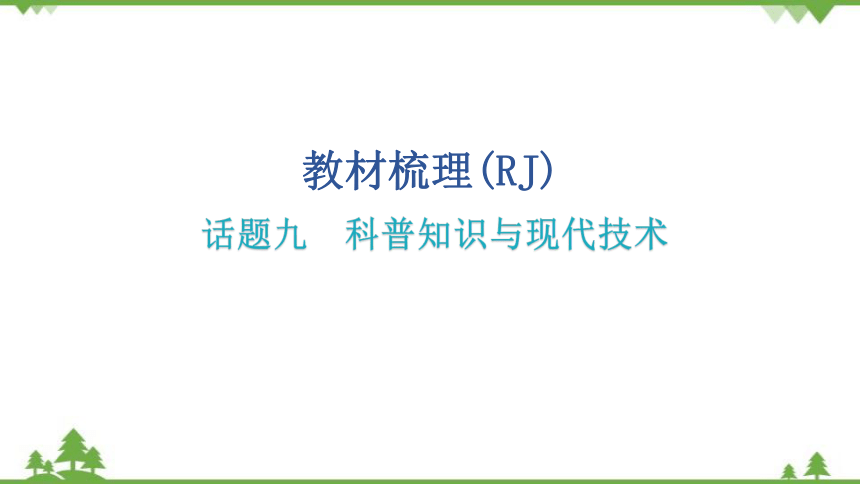 | |
| 格式 | pptx | ||
| 文件大小 | 314.4KB | ||
| 资源类型 | 教案 | ||
| 版本资源 | 人教新目标(Go for it)版 | ||
| 科目 | 英语 | ||
| 更新时间 | 2022-05-29 12:30:17 | ||
图片预览

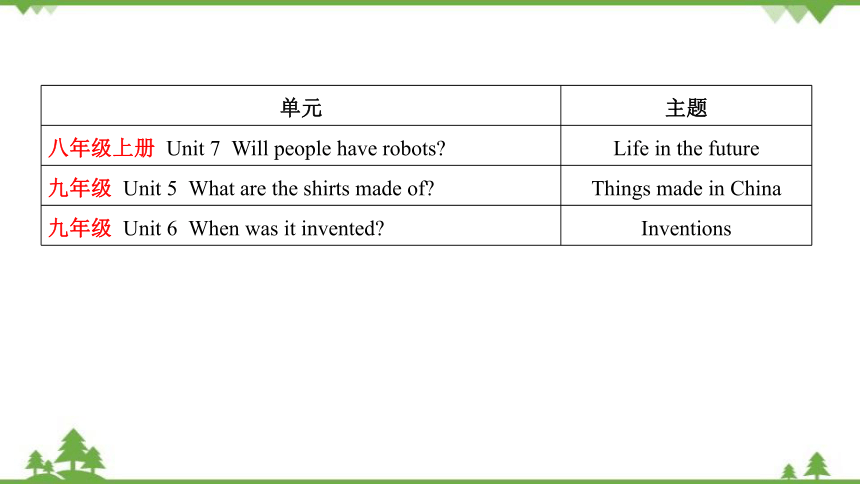
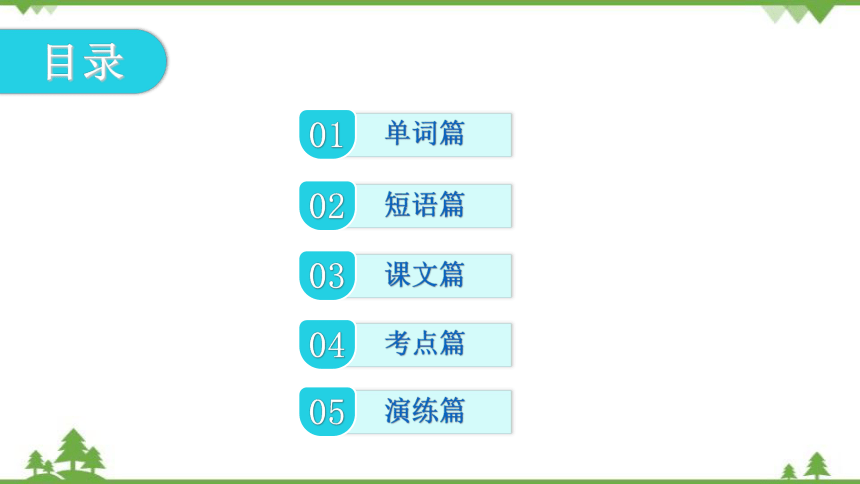
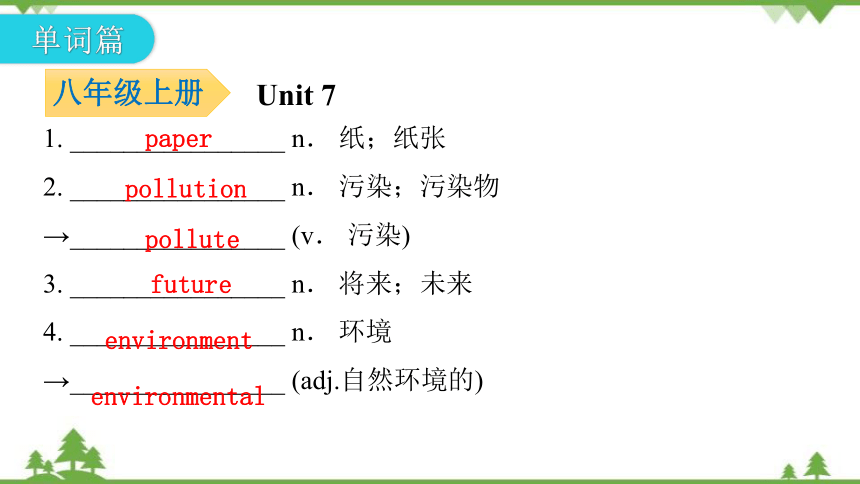

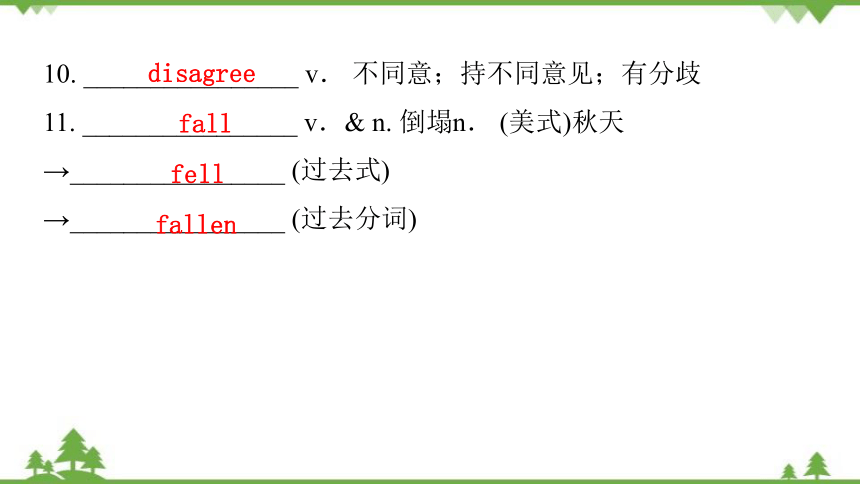

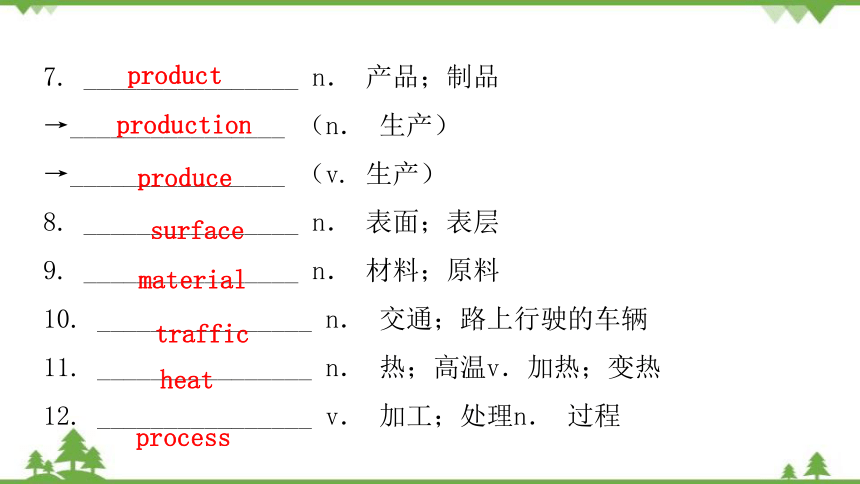
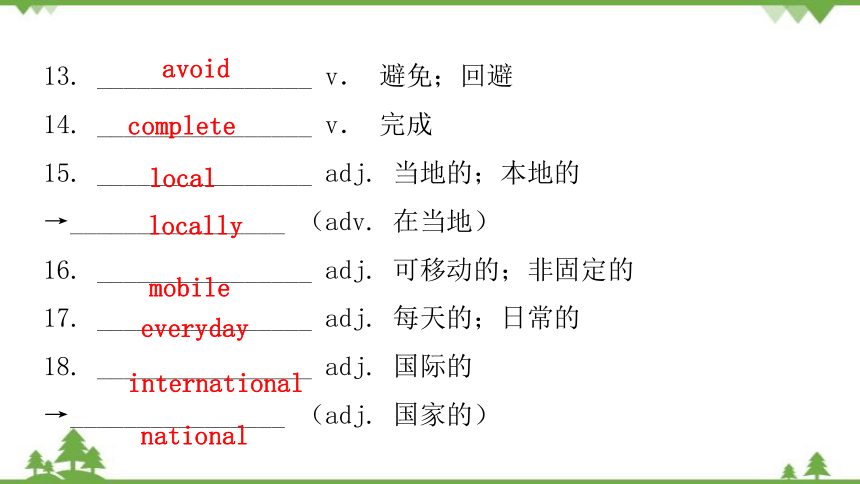
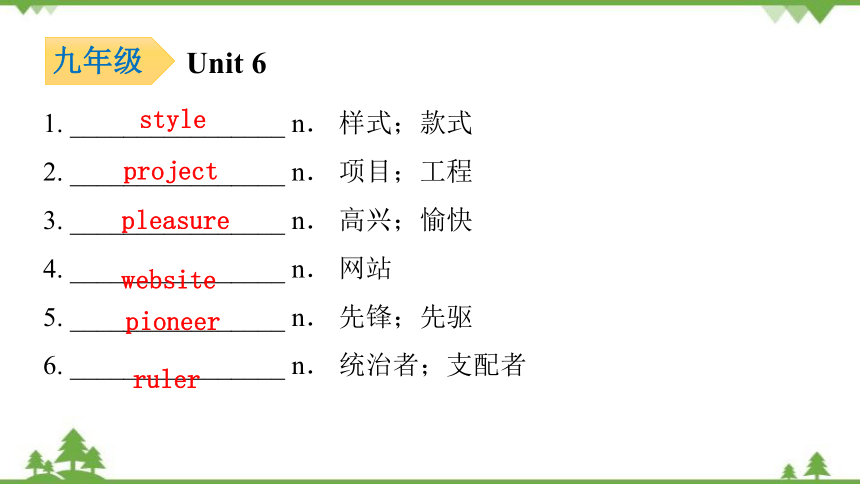
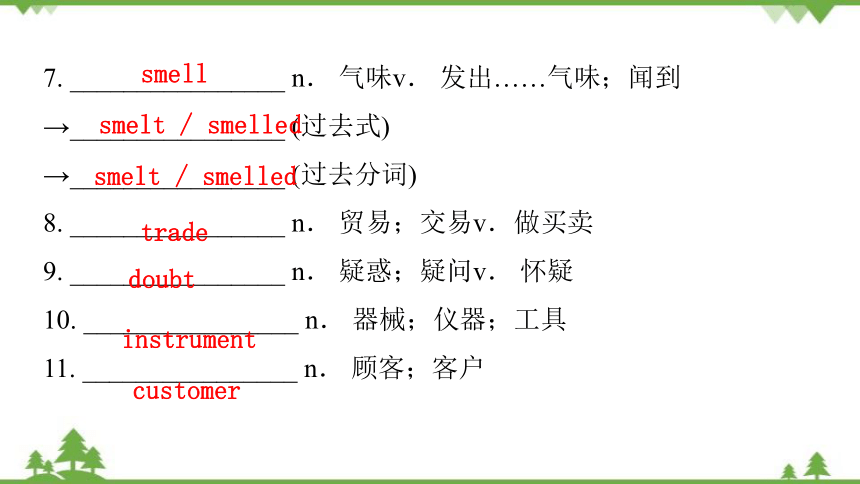
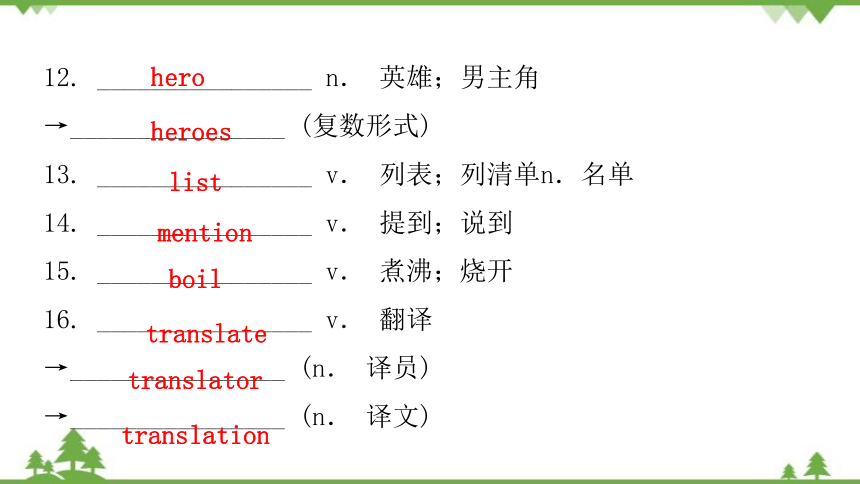
文档简介
(共68张PPT)
教材梳理(RJ)
话题九 科普知识与现代技术
单元 主题
八年级上册 Unit 7 Will people have robots Life in the future
九年级 Unit 5 What are the shirts made of Things made in China
九年级 Unit 6 When was it invented Inventions
目录
01
单词篇
02
短语篇
03
课文篇
04
考点篇
05
演练篇
单词篇
八年级上册
Unit 7
1. ________________ n. 纸;纸张
2. ________________ n. 污染;污染物
→________________ (v. 污染)
3. ________________ n. 将来;未来
4. ________________ n. 环境
→________________ (adj.自然环境的)
paper
pollution
pollute
future
environment
environmental
5. ________________ n. 行星
6. ________________ n. 地球;世界
7. ________________ n. 太空;空间
8. ________________ v. 种植n. 植物
9. ________________ v. 建筑;建造
→________________ (过去式 / 过去分词)
→________________ (n. 建筑)
planet
earth
space
plant
build
built
building
10. ________________ v. 不同意;持不同意见;有分歧
11. ________________ v.& n. 倒塌n. (美式)秋天
→________________ (过去式)
→________________ (过去分词)
disagree
fall
fell
fallen
1. ________________ n. 银;银器 adj.银色的
2. ________________ n. 玻璃
3. ________________ n. 棉;棉花
4. ________________ n. 钢;钢铁
5. ________________ n. 展览会;交易会
6. ________________ n. 叶;叶子
→________________ (复数形式)
九年级
Unit 5
silver
glass
cotton
steel
fair
leaf
leaves
7. ________________ n. 产品;制品
→________________ (n. 生产)
→________________ (v. 生产)
8. ________________ n. 表面;表层
9. ________________ n. 材料;原料
10. ________________ n. 交通;路上行驶的车辆
11. ________________ n. 热;高温v.加热;变热
12. ________________ v. 加工;处理n. 过程
product
production
produce
surface
material
traffic
heat
process
13. ________________ v. 避免;回避
14. ________________ v. 完成
15. ________________ adj. 当地的;本地的
→________________ (adv. 在当地)
16. ________________ adj. 可移动的;非固定的
17. ________________ adj. 每天的;日常的
18. ________________ adj. 国际的
→________________ (adj. 国家的)
avoid
complete
local
locally
mobile
everyday
international
national
1. ________________ n. 样式;款式
2. ________________ n. 项目;工程
3. ________________ n. 高兴;愉快
4. ________________ n. 网站
5. ________________ n. 先锋;先驱
6. ________________ n. 统治者;支配者
九年级
Unit 6
style
project
pleasure
website
pioneer
ruler
7. ________________ n. 气味v. 发出……气味;闻到
→________________ (过去式)
→________________ (过去分词)
8. ________________ n. 贸易;交易v.做买卖
9. ________________ n. 疑惑;疑问v. 怀疑
10. ________________ n. 器械;仪器;工具
11. ________________ n. 顾客;客户
smell
smelt / smelled
smelt / smelled
trade
doubt
instrument
customer
12. ________________ n. 英雄;男主角
→________________ (复数形式)
13. ________________ v. 列表;列清单n.名单
14. ________________ v. 提到;说到
15. ________________ v. 煮沸;烧开
16. ________________ v. 翻译
→________________ (n. 译员)
→________________ (n. 译文)
hero
heroes
list
mention
boil
translate
translator
translation
17. ________________ v. 锁上;锁住n.锁
18. ________________ v. (使)发出钟声或铃声;打电话
→________________ (过去式)
→________________ (过去分词)
lock
ring
rang
rung
短语篇
八年级上册
Unit 7
1.活到……岁 __________________________
2.处于极大危险之中 __________________________
3.拯救地球 __________________________
4.醒来 __________________________
5.不同意;不赞成 __________________________
live to be … years old
be in great danger
save the earth
wake up
disagree with
6.突然倒下;跌倒;倒塌 ________________
7.寻找;寻求 ________________
8.淡水 ________________
9.在将来 ________________
10.太空站;宇宙空间站 ________________
11.多次;反复地 ______________________
12.参与;发挥作用 ________________
fall down
look for
fresh water
in the future
space station
over and over again
play a part
九年级
Unit 5
1.由……制成 ___________________________
2.在……(地方 / 时间)制造 ___________________________
3.即使;虽然 ___________________________
4.确切地说;事实上;实际上 ___________________________
5.交通事故 ___________________________
6.把……变成…… ___________________________
be made of / from …
be made in …
even though
in fact
traffic accident
turn … into …
7.根据 ________________
8.处于困境;遇到麻烦 ________________
9.被……覆盖 _____________________
10.避免做某事 ______________________
11.以……闻名;为人知晓 ____________________
according to
in trouble
be covered with …
avoid doing sth.
be known for
九年级
Unit 6
1.偶然;意外地 ________________
2.掉进…… ________________
3.发生;出现 ________________
4.毫无疑问;的确 ________________
5.突然;猛地 ________________
6.错误地;无意中 ________________
by accident
fall into …
take place
without doubt
all of a sudden
by mistake
7.把……分开 ________________
8.梦想;幻想;向往 ________________
9.……的数量 ____________________
10.钦佩;仰慕 ________________
11.提出;想出 _____________________
12.导致 ________________
13.阻止……做…… _________________________
divide … into
dream of
the number of …
look up to
come up with
lead to
stop … from doing …
八年级上册
Unit 7
1.——未来会是什么样子
________________________________________________
——城市将会更拥挤,污染会更严重。
________________________________________________
课文篇
—What will the future be like
—Cities will be more crowded and polluted.
2.有些(机器人)可以帮助制造小汽车,并且它们反复地干着简单的工作。
Some can ________________, and they do simple jobs _____________________.
3.虽然我们能够让机器人像人类一样活动,但是让它们真正像人一样思考将会很难。
_________ we can make robots move like people, ________________ make them really think _________________.
help to build cars
over and over again
Although
it will be difficult to
like a human
九年级
Unit 5
1.——这个飞机模型是由什么制成的
________________________________________________
——它是由用过的木头和玻璃制成的。
________________________________________________
2.似乎世界各地许多人都喝中国茶。
________________ many people ________________ drink Chinese tea.
—What’s the model plane made of
—It’s made of used wood and glass.
It seems that
all over the world
3.它们被视为幸福和美好祝愿的光明象征。
They ________________________________ happiness and good wishes.
are seen as bright symbols of
九年级
Unit 6
1.——茶什么时候被带到了韩国
____________________________________________________
——它是在六七世纪被带到韩国的。
____________________________________________________
—When was tea brought to Korea
—It was brought to Korea during the 6th and 7th centuries.
2.篮球是一项备受喜爱和充满活力的运动,因其娱乐性和锻炼(方式),它被很多人喜欢。
Basketball is ____________________________ sport that __________________ many for fun and exercise.
a much-loved and active
is enjoyed by
考点1
一般将来时【八年级上册 Unit 7】
专练
( )1.—Will there be more trees —_________.
A.Yes, they will
B.Yes, there will
C.No, there aren’t
D.No, they won’t
考点篇
B
( )2.Hurry up! The bus _________ very soon.
A.leave B.left C.will leave D.is leave
( )3.Three years ago, he _____ in high school.Now he _____ in university.Next year, he _______ a computer programmer.
A.was; is; will be B.were; is; will be
C.is; will be; was D.was; is; is
C
A
( )4.I know there _________ a sports meeting next month.
A.will have B.is C.will be D.is going to have
( )5.Mr.Wang will come back from Guangzhou _________.
A.for two days B.in three hours
C.during a week D.three hours ago
C
B
点拨
一般将来时
用法 表示将来某个时间要发生的动作或存在的状态。常与表示将来的时间状语连用,如:in+时间段, next week, tomorrow, later on等。
构成 助动词will+动词原形
【注意】对“in+时间段”进行提问时,要用how soon, 表示“多久以后”
【拓展】there be句型的一般将来时为“There will be …” 表示“将有……”
考点2
such和so的区别【八年级上册 Unit 7】
专练 根据句意,用such或so填空
1.The man told us ______________ funny a story.
2.She has ________________ a beautiful dress.
3.How can you get ______________ much money to buy the car
4.Don’t go out in ________________ cold weather.
5.Don’t eat ______________ quickly.
so
such
so
such
so
点拨 1.such常用来修饰名词,so常用来修饰形容词或副词。2.当名词前有many,much,few 或 little等表示数量的词修饰时,用so而不用such。3.“such + a / an +adj.+可数名词单数”相当于“so +adj.+ a / an +可数名词单数”,表示“如此……的一个 / 件 / 份……”。
考点3
agree的用法【八年级上册 Unit 7】
专练
1.If you agree with me, you can nod your head.(改为同义句)
=If you ___________ (agree) with me, you can shake your head.
disagree
2.汉译英
(1)我的笔友同意帮助我了。___________________________
(2)你同意我的计划吗 ___________________________
My pen pal agreed to help me.
Do you agree with my plan
点拨
短语 含义及用法
agree with sb. / (doing) sth. 主观意愿的“赞成;同意”
agree on / upon sth. 双方或多方“在……方面取得一致意见”或“在……方面达成非正式协议”
agree to sth. 非主观意愿的“接受;认可”,尤指不乐意或争论后的“同意”
agree to do sth. 同意做……
agree + that 从句 同意……
考点4
各种时态的被动语态【九年级 Unit 5】
专练
( )1.In China,badminton _________ everywhere.
A.played B.is played
C.are played D.plays
B
( )2.—Excuse me, sir. Smoking _________ in the gas station.
—Oh, I’m really sorry.
A.doesn’t allow B.isn’t allowed
C.aren’t allowed D.allows
B
( )3.Many houses _________ in the earthquake of April 20th, 2013 in Ya’an.
A.is destroyed B.are destroyed
C.were destroyed D.destroyed
( )4.The homework _________ in ten minutes.
A.was finished B.is finished
C.will be finished D.finish
C
C
( )5.Personal computers _________ about 40 years ago.
A.invented B.was invented
C.were invented D.was invented by
点拨 被动语态由“助动词be + 及物动词的过去分词”构成。助动词be有人称、数和时态的变化,其变化规则与be作为连系动词时完全一样。(详解见主书第一部分[第九节 被动语态])
C
考点5
everyday和every day的区别【九年级 Unit 5】
专练 根据句意,用everyday或every day填空
1.This is his ________________ work.
2.She gets up at half past five in the morning ________________.
3.My brother practices ___________ English ________________.
everyday
every day
everyday
every day
点拨
比较项 含义及用法
everyday 作形容词,意为“每天的; 日常的”,在句中作定语, 用来修饰名词
every day 副词短语,意为“每天”,在句中主要用作时间状语
考点6
be made of, be made from, be made into, be made in和be made by的区别【九年级 Unit 5】
专练 根据汉语意思完成句子,词数不限
1.葡萄酒是葡萄制成的。 Grape wine ________________ grapes.
2.桌子是木材制成的。The desks ________________ wood.
3.那张报纸被制成了一顶帽子。
The newspaper ________________ a hat.
is made from
are made of
was made into
4.那个瓷器是中国生产的。The china ________________ China.
5.那个飞机模型是李林做的。
The model plane ________________ Li Lin.
is made in
is made by
点拨
比较项 含义 用法
be made of 由……(材料)制成的 能看出原材料,发生的是物理变化
be made from 由……(材料)制成的 看不出原材料,发生的是化学变化
be made into 被制成…… into后面跟成品
be made in 在……制造 后接表示地点或时间的词语
be made by 由……制造 后接动作的执行者
考点7
invent, discover, create, find和find out的区别
【九年级 Unit 6】
专练 根据句意,用invent, discover, create, find或find out的适当形式填空
1.I have ________________ many spelling mistakes in your composition.
2.Do you know who ________________ bikes
found
invented
3.Columbus ________________ the New World.
4.Mr.Wang asked his son to ________________ what time the train leaves.
5.Philip Glass ________________ a new kind of music.
discovered
find out
created
点拨
比较项 含义及用法
invent 意为“发明;创造”,指通过研究和实验而“创造;发明”出前所未有的产品或装置,尤指科技上的发明创造
discover 意为“发现;发觉”,表示发现过去就存在但未被人们发现或知晓的事物,如地点、物体或事实等
create 意为“创造;创建”,指从无到有的创作或创作出原本不存在的东西,如艺术作品、理论等
find 意为“找到;发现”,指经过一番努力后“找到”丢失的人或东西。强调“找”的结果
find out 意为“查明;弄清”,多指通过调查、询问、研究之后“搞清楚;弄明白”,通常含有“历经艰难曲折”的含义
考点8
the number of和a number of的区别 【九年级Unit 6】
专练
( )1.The number of the rest apples _________ more than 10 in the fridge today.
A.are B.is C.were D.was
( )2.A number of students _________ having a good time in the playground right now.
A.are B.is C.were D.was
B
A
点拨 the number of意为“……的数量”,作主语时谓语动词用单数形式; a number of意为“许多”,后面的谓语动词用复数形式。
演练篇
一、完形填空
Thomas Edison was born on February 11th, 1847. He was a great American inventor and businessman. He developed many devices (设备) which greatly _1 _ the life in the 20th century. During his lifetime, he has made 1093 inventions. He made so many _2 _ that he becomes the fourth most prolific (多产的) inventor in history. He was so successful because he was the man
influenced
inventions
who never _3 _. He believed that nothing was difficult if you put your heart into it. So he could always find the ways to _4 _ the difficult problems.
When Edison was a child, he was curious (好奇的) about everything he didn’t understand. Once he asked his father, “_5 _ are able to have chicks, why can’t I ” This made everyone laugh. When he was at school, he was always asking _6 _ questions that
gave up
solve
Hens
strange
had nothing to do with his lesson. The teacher couldn’t answer him and got _7 _. At last, he couldn’t continue his study at school.
Edison was a _8 _ clever boy. He used his new idea to save his mother’s life. One day, his mother was badly ill and she needed an operation _9 _, but it was night and the light was too dull. Edison took all the lights in the house and put them on a long table.
angry
really
at once
Then he put a big mirror behind them. _10_, there was enough light. The doctor could see clearly and operated his mother right away.
In this way
( )1. A. accepted B. caused
C. invented D. influenced
( )2. A. mistakes B. inventions C. notes D. decisions
( )3. A. gave up B. gave away
C. gave out D. gave back
( )4. A. know B. think C. suppose D. solve
( )5. A. Sheep B. Cows C. Ducks D. Hens
D
B
A
D
D
( )6. A. boring B. easy C. strange D. important
( )7. A. happy B. angry C. surprised D. worried
( )8. A. really B. simply C. badly D. clearly
( )9. A. at times B. at first C. at once D. at all
( )10. A. On the way B. By the way
C. In this way D. In a way
C
B
A
C
C
二、阅读理解(B篇)
A group called New Story is working with a company called Icon to build lots of houses.These houses are for poor people.The way they are doing is very special—they are 3D-printing the houses.
In 2018, Icon created the first 3D-printed house in the United States.New Story is a group that works to bring cheap but good
houses to people who can’t afford them.The group has built over 2,700 houses in places like Bolivia, El Salvador, Haiti and Mexico.
Icon and New Story have shown two new 3D-printed houses in a new neighborhood in Tabasco, Mexico.There are other 48 houses to be printed in the community for very poor people from the area, apart from these first two that have been finished.These two houses have two bedrooms, a living room, a kitchen, and a
bathroom.Because such houses are created with a computer design, it’s easy to change the design to meet the needs of different families.
Their printer is a machine called Vulcan II.The houses are built on a hard concrete base(混凝土地基).And the base, is not 3D-printed, and it must be made in a normal way.The machine works well.A 46-square-meter home was printed and built in about
24 hours.New Story and Icon believe that with practice they can learn to make the houses even more quickly and bring the price of making them down even farther—perhaps as low as $3,500.
( )1.The first 3D-printed house created by Icon appeared _________.
A.in Haiti B.in Mexico C.in the USA D.in Bolivia
C
( )2.New Story makes 3D-printed houses _________.
A.for a company called Icon
B.for poor families in some countries
C.for students in poor countries
D.for very special people in many places
B
( )3.The new community in Mexico _________.
A.costs $3,500
B.was built in about 24 hours
C.has two finished 3D-printed houses
D.has fifty 3D-printed houses to be finished
C
( )4.Which is TRUE about the 3D-printed houses
A.They are cheaper than normal houses.
B.All parts of the houses are made by 3D-printing.
C.They will be sold to the poor at a very high price.
D.The building of them takes more time than usual.
A
( )5.Which is the best title of this passage
A.3D-printed Homes for the Poor
B.New Story Has Built Many Houses
C.How to Build a 3D-printed House
D.Many Things Can Be Done for the Poor
A
三、回答问题
Imagine you are driving to school without looking at street signs,cars and people on the road! Is that even possible Yes! Driverless technology is improving every day,and it’s only a matter of time before fully driverless cars appear on public streets.Car makers and others are already testing driverless cars.Some companies are working together on driverless technology.Intel is
working with BMW and Mobileye on a driverless car.Google and Nissan are making their own driverless cars.Driverless cars may be for sale by 2025!
Google’s name for its driverless system is “chauffeur”.It’s a good name because a chauffeur is a person who drives your car and takes you places.Google’s chauffeur system drives your car and takes you places,but it is not a person! This amazing system takes the place of the human chauffeur.
A driverless car can see the road better than people with the help of radar(雷达)and cameras.Radar helps the car see things up to 100 meters away even in darkness or rain.Cameras help the car see objects that are close.
In the future,both cars with drivers and cars without drivers may share the road.You will have a choice.You can be the driver of your car,or you can look out the window while the car drives you.
1.When may the driverless cars be for sale according to the passage
_____________________________________________________
_____________________________________________________
2.What does the word “chauffeur” mean traditionally
_____________________________________________________
_____________________________________________________
The driverless cars / They may be for sale by 2025 according to the passage. / By 2025.
It means a person who drives your car and takes you places. / A person who drives your car and takes you places.
3.How can a driverless car see the road better than people
_____________________________________________________
_____________________________________________________
_____________________________________________________
4.How far does the radar help the car to see things up away even in darkness or rain according to the passage
_____________________________________________________
_____________________________________________________
A driverless car / It can see the road better than people with the help of radar and cameras. / With the help of radar and cameras.
The radar / It helps the car to see things up to 100 meters away even in darkness or rain according to the passage. / 100 meters.
5.What’s the passage mainly about
_____________________________________________________
It’s mainly about driverless technology. / Driverless technology.
谢 谢!
教材梳理(RJ)
话题九 科普知识与现代技术
单元 主题
八年级上册 Unit 7 Will people have robots Life in the future
九年级 Unit 5 What are the shirts made of Things made in China
九年级 Unit 6 When was it invented Inventions
目录
01
单词篇
02
短语篇
03
课文篇
04
考点篇
05
演练篇
单词篇
八年级上册
Unit 7
1. ________________ n. 纸;纸张
2. ________________ n. 污染;污染物
→________________ (v. 污染)
3. ________________ n. 将来;未来
4. ________________ n. 环境
→________________ (adj.自然环境的)
paper
pollution
pollute
future
environment
environmental
5. ________________ n. 行星
6. ________________ n. 地球;世界
7. ________________ n. 太空;空间
8. ________________ v. 种植n. 植物
9. ________________ v. 建筑;建造
→________________ (过去式 / 过去分词)
→________________ (n. 建筑)
planet
earth
space
plant
build
built
building
10. ________________ v. 不同意;持不同意见;有分歧
11. ________________ v.& n. 倒塌n. (美式)秋天
→________________ (过去式)
→________________ (过去分词)
disagree
fall
fell
fallen
1. ________________ n. 银;银器 adj.银色的
2. ________________ n. 玻璃
3. ________________ n. 棉;棉花
4. ________________ n. 钢;钢铁
5. ________________ n. 展览会;交易会
6. ________________ n. 叶;叶子
→________________ (复数形式)
九年级
Unit 5
silver
glass
cotton
steel
fair
leaf
leaves
7. ________________ n. 产品;制品
→________________ (n. 生产)
→________________ (v. 生产)
8. ________________ n. 表面;表层
9. ________________ n. 材料;原料
10. ________________ n. 交通;路上行驶的车辆
11. ________________ n. 热;高温v.加热;变热
12. ________________ v. 加工;处理n. 过程
product
production
produce
surface
material
traffic
heat
process
13. ________________ v. 避免;回避
14. ________________ v. 完成
15. ________________ adj. 当地的;本地的
→________________ (adv. 在当地)
16. ________________ adj. 可移动的;非固定的
17. ________________ adj. 每天的;日常的
18. ________________ adj. 国际的
→________________ (adj. 国家的)
avoid
complete
local
locally
mobile
everyday
international
national
1. ________________ n. 样式;款式
2. ________________ n. 项目;工程
3. ________________ n. 高兴;愉快
4. ________________ n. 网站
5. ________________ n. 先锋;先驱
6. ________________ n. 统治者;支配者
九年级
Unit 6
style
project
pleasure
website
pioneer
ruler
7. ________________ n. 气味v. 发出……气味;闻到
→________________ (过去式)
→________________ (过去分词)
8. ________________ n. 贸易;交易v.做买卖
9. ________________ n. 疑惑;疑问v. 怀疑
10. ________________ n. 器械;仪器;工具
11. ________________ n. 顾客;客户
smell
smelt / smelled
smelt / smelled
trade
doubt
instrument
customer
12. ________________ n. 英雄;男主角
→________________ (复数形式)
13. ________________ v. 列表;列清单n.名单
14. ________________ v. 提到;说到
15. ________________ v. 煮沸;烧开
16. ________________ v. 翻译
→________________ (n. 译员)
→________________ (n. 译文)
hero
heroes
list
mention
boil
translate
translator
translation
17. ________________ v. 锁上;锁住n.锁
18. ________________ v. (使)发出钟声或铃声;打电话
→________________ (过去式)
→________________ (过去分词)
lock
ring
rang
rung
短语篇
八年级上册
Unit 7
1.活到……岁 __________________________
2.处于极大危险之中 __________________________
3.拯救地球 __________________________
4.醒来 __________________________
5.不同意;不赞成 __________________________
live to be … years old
be in great danger
save the earth
wake up
disagree with
6.突然倒下;跌倒;倒塌 ________________
7.寻找;寻求 ________________
8.淡水 ________________
9.在将来 ________________
10.太空站;宇宙空间站 ________________
11.多次;反复地 ______________________
12.参与;发挥作用 ________________
fall down
look for
fresh water
in the future
space station
over and over again
play a part
九年级
Unit 5
1.由……制成 ___________________________
2.在……(地方 / 时间)制造 ___________________________
3.即使;虽然 ___________________________
4.确切地说;事实上;实际上 ___________________________
5.交通事故 ___________________________
6.把……变成…… ___________________________
be made of / from …
be made in …
even though
in fact
traffic accident
turn … into …
7.根据 ________________
8.处于困境;遇到麻烦 ________________
9.被……覆盖 _____________________
10.避免做某事 ______________________
11.以……闻名;为人知晓 ____________________
according to
in trouble
be covered with …
avoid doing sth.
be known for
九年级
Unit 6
1.偶然;意外地 ________________
2.掉进…… ________________
3.发生;出现 ________________
4.毫无疑问;的确 ________________
5.突然;猛地 ________________
6.错误地;无意中 ________________
by accident
fall into …
take place
without doubt
all of a sudden
by mistake
7.把……分开 ________________
8.梦想;幻想;向往 ________________
9.……的数量 ____________________
10.钦佩;仰慕 ________________
11.提出;想出 _____________________
12.导致 ________________
13.阻止……做…… _________________________
divide … into
dream of
the number of …
look up to
come up with
lead to
stop … from doing …
八年级上册
Unit 7
1.——未来会是什么样子
________________________________________________
——城市将会更拥挤,污染会更严重。
________________________________________________
课文篇
—What will the future be like
—Cities will be more crowded and polluted.
2.有些(机器人)可以帮助制造小汽车,并且它们反复地干着简单的工作。
Some can ________________, and they do simple jobs _____________________.
3.虽然我们能够让机器人像人类一样活动,但是让它们真正像人一样思考将会很难。
_________ we can make robots move like people, ________________ make them really think _________________.
help to build cars
over and over again
Although
it will be difficult to
like a human
九年级
Unit 5
1.——这个飞机模型是由什么制成的
________________________________________________
——它是由用过的木头和玻璃制成的。
________________________________________________
2.似乎世界各地许多人都喝中国茶。
________________ many people ________________ drink Chinese tea.
—What’s the model plane made of
—It’s made of used wood and glass.
It seems that
all over the world
3.它们被视为幸福和美好祝愿的光明象征。
They ________________________________ happiness and good wishes.
are seen as bright symbols of
九年级
Unit 6
1.——茶什么时候被带到了韩国
____________________________________________________
——它是在六七世纪被带到韩国的。
____________________________________________________
—When was tea brought to Korea
—It was brought to Korea during the 6th and 7th centuries.
2.篮球是一项备受喜爱和充满活力的运动,因其娱乐性和锻炼(方式),它被很多人喜欢。
Basketball is ____________________________ sport that __________________ many for fun and exercise.
a much-loved and active
is enjoyed by
考点1
一般将来时【八年级上册 Unit 7】
专练
( )1.—Will there be more trees —_________.
A.Yes, they will
B.Yes, there will
C.No, there aren’t
D.No, they won’t
考点篇
B
( )2.Hurry up! The bus _________ very soon.
A.leave B.left C.will leave D.is leave
( )3.Three years ago, he _____ in high school.Now he _____ in university.Next year, he _______ a computer programmer.
A.was; is; will be B.were; is; will be
C.is; will be; was D.was; is; is
C
A
( )4.I know there _________ a sports meeting next month.
A.will have B.is C.will be D.is going to have
( )5.Mr.Wang will come back from Guangzhou _________.
A.for two days B.in three hours
C.during a week D.three hours ago
C
B
点拨
一般将来时
用法 表示将来某个时间要发生的动作或存在的状态。常与表示将来的时间状语连用,如:in+时间段, next week, tomorrow, later on等。
构成 助动词will+动词原形
【注意】对“in+时间段”进行提问时,要用how soon, 表示“多久以后”
【拓展】there be句型的一般将来时为“There will be …” 表示“将有……”
考点2
such和so的区别【八年级上册 Unit 7】
专练 根据句意,用such或so填空
1.The man told us ______________ funny a story.
2.She has ________________ a beautiful dress.
3.How can you get ______________ much money to buy the car
4.Don’t go out in ________________ cold weather.
5.Don’t eat ______________ quickly.
so
such
so
such
so
点拨 1.such常用来修饰名词,so常用来修饰形容词或副词。2.当名词前有many,much,few 或 little等表示数量的词修饰时,用so而不用such。3.“such + a / an +adj.+可数名词单数”相当于“so +adj.+ a / an +可数名词单数”,表示“如此……的一个 / 件 / 份……”。
考点3
agree的用法【八年级上册 Unit 7】
专练
1.If you agree with me, you can nod your head.(改为同义句)
=If you ___________ (agree) with me, you can shake your head.
disagree
2.汉译英
(1)我的笔友同意帮助我了。___________________________
(2)你同意我的计划吗 ___________________________
My pen pal agreed to help me.
Do you agree with my plan
点拨
短语 含义及用法
agree with sb. / (doing) sth. 主观意愿的“赞成;同意”
agree on / upon sth. 双方或多方“在……方面取得一致意见”或“在……方面达成非正式协议”
agree to sth. 非主观意愿的“接受;认可”,尤指不乐意或争论后的“同意”
agree to do sth. 同意做……
agree + that 从句 同意……
考点4
各种时态的被动语态【九年级 Unit 5】
专练
( )1.In China,badminton _________ everywhere.
A.played B.is played
C.are played D.plays
B
( )2.—Excuse me, sir. Smoking _________ in the gas station.
—Oh, I’m really sorry.
A.doesn’t allow B.isn’t allowed
C.aren’t allowed D.allows
B
( )3.Many houses _________ in the earthquake of April 20th, 2013 in Ya’an.
A.is destroyed B.are destroyed
C.were destroyed D.destroyed
( )4.The homework _________ in ten minutes.
A.was finished B.is finished
C.will be finished D.finish
C
C
( )5.Personal computers _________ about 40 years ago.
A.invented B.was invented
C.were invented D.was invented by
点拨 被动语态由“助动词be + 及物动词的过去分词”构成。助动词be有人称、数和时态的变化,其变化规则与be作为连系动词时完全一样。(详解见主书第一部分[第九节 被动语态])
C
考点5
everyday和every day的区别【九年级 Unit 5】
专练 根据句意,用everyday或every day填空
1.This is his ________________ work.
2.She gets up at half past five in the morning ________________.
3.My brother practices ___________ English ________________.
everyday
every day
everyday
every day
点拨
比较项 含义及用法
everyday 作形容词,意为“每天的; 日常的”,在句中作定语, 用来修饰名词
every day 副词短语,意为“每天”,在句中主要用作时间状语
考点6
be made of, be made from, be made into, be made in和be made by的区别【九年级 Unit 5】
专练 根据汉语意思完成句子,词数不限
1.葡萄酒是葡萄制成的。 Grape wine ________________ grapes.
2.桌子是木材制成的。The desks ________________ wood.
3.那张报纸被制成了一顶帽子。
The newspaper ________________ a hat.
is made from
are made of
was made into
4.那个瓷器是中国生产的。The china ________________ China.
5.那个飞机模型是李林做的。
The model plane ________________ Li Lin.
is made in
is made by
点拨
比较项 含义 用法
be made of 由……(材料)制成的 能看出原材料,发生的是物理变化
be made from 由……(材料)制成的 看不出原材料,发生的是化学变化
be made into 被制成…… into后面跟成品
be made in 在……制造 后接表示地点或时间的词语
be made by 由……制造 后接动作的执行者
考点7
invent, discover, create, find和find out的区别
【九年级 Unit 6】
专练 根据句意,用invent, discover, create, find或find out的适当形式填空
1.I have ________________ many spelling mistakes in your composition.
2.Do you know who ________________ bikes
found
invented
3.Columbus ________________ the New World.
4.Mr.Wang asked his son to ________________ what time the train leaves.
5.Philip Glass ________________ a new kind of music.
discovered
find out
created
点拨
比较项 含义及用法
invent 意为“发明;创造”,指通过研究和实验而“创造;发明”出前所未有的产品或装置,尤指科技上的发明创造
discover 意为“发现;发觉”,表示发现过去就存在但未被人们发现或知晓的事物,如地点、物体或事实等
create 意为“创造;创建”,指从无到有的创作或创作出原本不存在的东西,如艺术作品、理论等
find 意为“找到;发现”,指经过一番努力后“找到”丢失的人或东西。强调“找”的结果
find out 意为“查明;弄清”,多指通过调查、询问、研究之后“搞清楚;弄明白”,通常含有“历经艰难曲折”的含义
考点8
the number of和a number of的区别 【九年级Unit 6】
专练
( )1.The number of the rest apples _________ more than 10 in the fridge today.
A.are B.is C.were D.was
( )2.A number of students _________ having a good time in the playground right now.
A.are B.is C.were D.was
B
A
点拨 the number of意为“……的数量”,作主语时谓语动词用单数形式; a number of意为“许多”,后面的谓语动词用复数形式。
演练篇
一、完形填空
Thomas Edison was born on February 11th, 1847. He was a great American inventor and businessman. He developed many devices (设备) which greatly _1 _ the life in the 20th century. During his lifetime, he has made 1093 inventions. He made so many _2 _ that he becomes the fourth most prolific (多产的) inventor in history. He was so successful because he was the man
influenced
inventions
who never _3 _. He believed that nothing was difficult if you put your heart into it. So he could always find the ways to _4 _ the difficult problems.
When Edison was a child, he was curious (好奇的) about everything he didn’t understand. Once he asked his father, “_5 _ are able to have chicks, why can’t I ” This made everyone laugh. When he was at school, he was always asking _6 _ questions that
gave up
solve
Hens
strange
had nothing to do with his lesson. The teacher couldn’t answer him and got _7 _. At last, he couldn’t continue his study at school.
Edison was a _8 _ clever boy. He used his new idea to save his mother’s life. One day, his mother was badly ill and she needed an operation _9 _, but it was night and the light was too dull. Edison took all the lights in the house and put them on a long table.
angry
really
at once
Then he put a big mirror behind them. _10_, there was enough light. The doctor could see clearly and operated his mother right away.
In this way
( )1. A. accepted B. caused
C. invented D. influenced
( )2. A. mistakes B. inventions C. notes D. decisions
( )3. A. gave up B. gave away
C. gave out D. gave back
( )4. A. know B. think C. suppose D. solve
( )5. A. Sheep B. Cows C. Ducks D. Hens
D
B
A
D
D
( )6. A. boring B. easy C. strange D. important
( )7. A. happy B. angry C. surprised D. worried
( )8. A. really B. simply C. badly D. clearly
( )9. A. at times B. at first C. at once D. at all
( )10. A. On the way B. By the way
C. In this way D. In a way
C
B
A
C
C
二、阅读理解(B篇)
A group called New Story is working with a company called Icon to build lots of houses.These houses are for poor people.The way they are doing is very special—they are 3D-printing the houses.
In 2018, Icon created the first 3D-printed house in the United States.New Story is a group that works to bring cheap but good
houses to people who can’t afford them.The group has built over 2,700 houses in places like Bolivia, El Salvador, Haiti and Mexico.
Icon and New Story have shown two new 3D-printed houses in a new neighborhood in Tabasco, Mexico.There are other 48 houses to be printed in the community for very poor people from the area, apart from these first two that have been finished.These two houses have two bedrooms, a living room, a kitchen, and a
bathroom.Because such houses are created with a computer design, it’s easy to change the design to meet the needs of different families.
Their printer is a machine called Vulcan II.The houses are built on a hard concrete base(混凝土地基).And the base, is not 3D-printed, and it must be made in a normal way.The machine works well.A 46-square-meter home was printed and built in about
24 hours.New Story and Icon believe that with practice they can learn to make the houses even more quickly and bring the price of making them down even farther—perhaps as low as $3,500.
( )1.The first 3D-printed house created by Icon appeared _________.
A.in Haiti B.in Mexico C.in the USA D.in Bolivia
C
( )2.New Story makes 3D-printed houses _________.
A.for a company called Icon
B.for poor families in some countries
C.for students in poor countries
D.for very special people in many places
B
( )3.The new community in Mexico _________.
A.costs $3,500
B.was built in about 24 hours
C.has two finished 3D-printed houses
D.has fifty 3D-printed houses to be finished
C
( )4.Which is TRUE about the 3D-printed houses
A.They are cheaper than normal houses.
B.All parts of the houses are made by 3D-printing.
C.They will be sold to the poor at a very high price.
D.The building of them takes more time than usual.
A
( )5.Which is the best title of this passage
A.3D-printed Homes for the Poor
B.New Story Has Built Many Houses
C.How to Build a 3D-printed House
D.Many Things Can Be Done for the Poor
A
三、回答问题
Imagine you are driving to school without looking at street signs,cars and people on the road! Is that even possible Yes! Driverless technology is improving every day,and it’s only a matter of time before fully driverless cars appear on public streets.Car makers and others are already testing driverless cars.Some companies are working together on driverless technology.Intel is
working with BMW and Mobileye on a driverless car.Google and Nissan are making their own driverless cars.Driverless cars may be for sale by 2025!
Google’s name for its driverless system is “chauffeur”.It’s a good name because a chauffeur is a person who drives your car and takes you places.Google’s chauffeur system drives your car and takes you places,but it is not a person! This amazing system takes the place of the human chauffeur.
A driverless car can see the road better than people with the help of radar(雷达)and cameras.Radar helps the car see things up to 100 meters away even in darkness or rain.Cameras help the car see objects that are close.
In the future,both cars with drivers and cars without drivers may share the road.You will have a choice.You can be the driver of your car,or you can look out the window while the car drives you.
1.When may the driverless cars be for sale according to the passage
_____________________________________________________
_____________________________________________________
2.What does the word “chauffeur” mean traditionally
_____________________________________________________
_____________________________________________________
The driverless cars / They may be for sale by 2025 according to the passage. / By 2025.
It means a person who drives your car and takes you places. / A person who drives your car and takes you places.
3.How can a driverless car see the road better than people
_____________________________________________________
_____________________________________________________
_____________________________________________________
4.How far does the radar help the car to see things up away even in darkness or rain according to the passage
_____________________________________________________
_____________________________________________________
A driverless car / It can see the road better than people with the help of radar and cameras. / With the help of radar and cameras.
The radar / It helps the car to see things up to 100 meters away even in darkness or rain according to the passage. / 100 meters.
5.What’s the passage mainly about
_____________________________________________________
It’s mainly about driverless technology. / Driverless technology.
谢 谢!
同课章节目录
- 词法
- 名词
- 动词和动词短语
- 动词语态
- 动词时态
- 助动词和情态动词
- 非谓语动词
- 冠词
- 代词
- 数词和量词
- 形容词副词及其比较等级
- 介词和介词短语
- 连词和感叹词
- 构词法
- 相似、相近词比较
- 句法
- 陈述句
- 一般疑问句和否定疑问句
- 特殊疑问句及选择疑问句
- 反意疑问句
- 存在句(There be句型)
- 宾语从句
- 定语从句
- 状语从句
- 主谓一致问题
- 简单句
- 并列句
- 复合句
- 主谓一致
- 主、表语从句
- 名词性从句
- 直接引语和间接引语
- 虚拟语气
- 感叹句
- 强调句
- 倒装句
- 祈使句
- 句子的成分
- 句子的分类
- 题型专区
- 单项选择部分
- 易错题
- 完形填空
- 阅读理解
- 词汇练习
- 听说训练
- 句型转换
- 补全对话
- 短文改错
- 翻译
- 书面表达
- 任务型阅读
- 语法填空
- 其他资料
